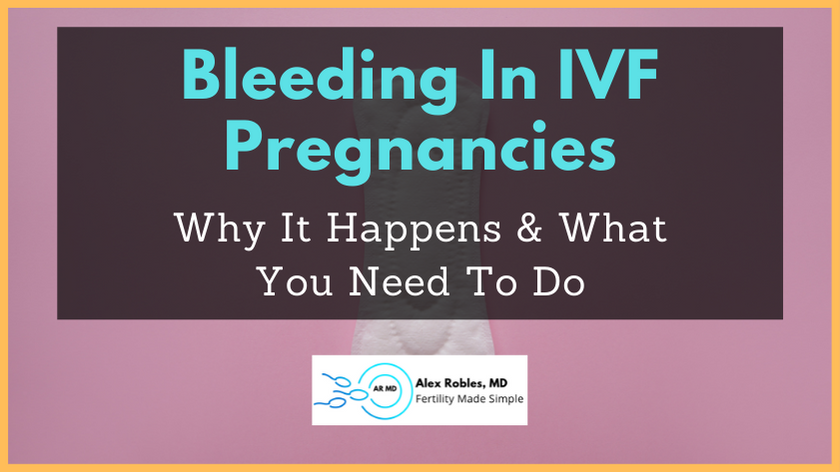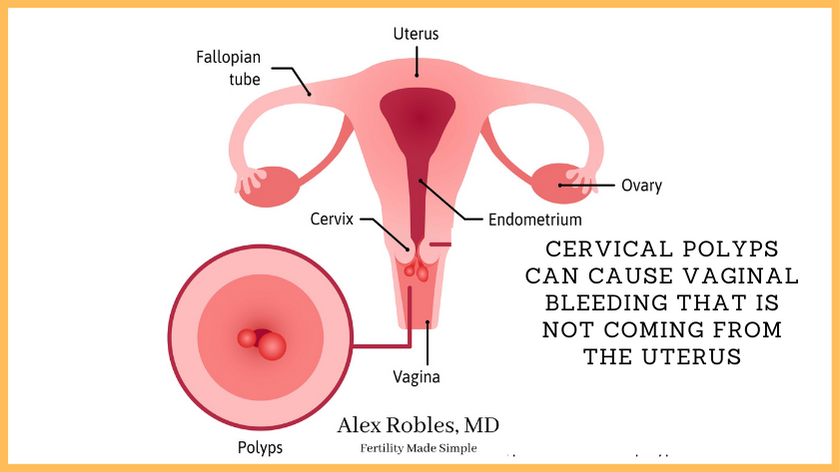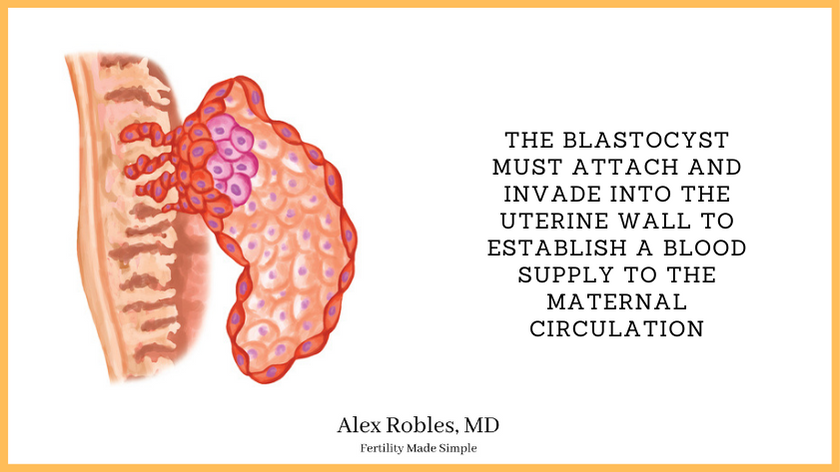Are you bleeding after your IVF pregnancy?
In this post, you will learn:
- How common early pregnancy bleeding after in vitro fertilization is,
- Why it happens, and
- What you need to do about it.
Let’s get started.

Is bleeding common with IVF pregnancies?
Bleeding after an IVF pregnancy is quite common. First trimester bleeding occurs in approximately 30-40% of all pregnancies and can begin at any point after the transfer. The good news is the majority of bleeding in the first trimester will stop on its own and not lead to miscarriage.
Does bleeding mean IVF has failed?
Bleeding or spotting after an IVF embryo transfer does not always indicate that the transfer has failed. If your spotting is light, minimal, and not associated with other symptoms, there is no cause for concern.
Many patients who have first trimester bleeding have normal healthy pregnancies.
Do your best to remain calm and avoid anything that can aggravate the bleeding, such as sexual intercourse or strenuous exercise.
What causes bleeding in IVF pregnancy?
Bleeding in the first trimester is often caused by
- implantation bleeding,
- subchorionic hematoma,
- polyps, or
- vaginal / cervical irritation.
Let’s go over them one by one.
Implantation bleeding
Implantation bleeding occurs during the first few days after the embryo implants into the lining of the uterus. The placenta has to burrow its way into the uterine lining to establish a blood supply with the maternal circulation.
The placenta grows rapidly during this period and produces large amounts of blood. Some blood vessels can rupture, and blood will escape from the uterus and present as light bleeding.
So what does implantation bleeding look like?
– light (pinkish) or brown-tinged
– minimal in quantity
Implantation bleeding will typically last a few days. It may also be associated with other pregnancy symptoms like mild cramping and breast tenderness.
Subchorionic Hemorrhage
A subchorionic hemorrhage occurs when a portion of the placenta slightly detaches from the uterine wall. A collection of blood will accumulate between the placenta and the uterus and can sometimes be seen on ultrasound.
The blood eventually clots, and some will come out of the uterus. Subchorionic hemorrhages are usually small and resolve without intervention. In addition, one study of 450 women with subchorionic hemorrhages (SCH) found no association between SCH and pregnancy loss.
Polyps
Polyps are benign growths that form in the cervix or endometrium. They are very common in the reproductive tract and often asymptomatic.
However, they can become enlarged in response to hormonal changes during pregnancy and can bleed if they are irritated or traumatized.

Vaginal/Cervical Irritation
Lastly, anything that can irritate the vagina or cervix can lead to light bleeding, such as frequent examinations, tampon use, sexual activity, etc.
Even frequent transvaginal ultrasounds can aggravate bleeding.
What happens if you bleed after an IVF transfer?
Unfortunately, there are no therapies or interventions available to treat or prevent early pregnancy bleeding.
We can perform an ultrasound and b-hCG blood test to reassure you, but the best thing to do is wait it out. The majority of cases of bleeding will stop on their own within a week or two.
Do your best to remain calm and continue monitoring your symptoms. There is nothing for you to do as long as the bleeding is not heavy and you aren’t experiencing significant cramping.
Stay well hydrated, avoid strenuous activity, and avoid putting anything in your vagina.
How much bleeding is normal after IVF?
After an IVF embryo transfer, bleeding is usually very light spotting (pink-tinged or brown). It can also be normal to see a small amount of bright red blood.
Either way, this type of bleeding is typically very mild and self-limiting.
Can you bleed heavily after IVF and still be pregnant?
It is possible to bleed heavily after IVF while passing clots and still be pregnant. I have personally seen several cases of heavy first trimester bleeding go on to have a normal healthy pregnancy.
Unfortunately, there is no intervention that can prevent this from happening.
It is also important to know when you should seek care immediately.
When should I be worried about bleeding during pregnancy?
If you experience heavy bleeding, which is defined as soaking one normal-sized pad in an hour, you should go to the emergency room immediately.
You should also go to the emergency room right away if you develop other signs of significant blood loss, which include
- severe abdominal pain,
- dizziness,
- nausea,
- vomiting,
- shortness of breath.
- chills
Unexplained shoulder pain is also concerning and can indicate a ruptured ectopic pregnancy.
Other Related Questions
Is bleeding in early pregnancy more common with IVF?
IVF pregnancies tend to bleed more commonly than spontaneous pregnancies. One study of over 1400 pregnancies demonstrates that bleeding in early pregnancy is more common in IVF than spontaneous conceptions (20-25% vs. 30-40% respectively).
Some reports even indicate that up to two-thirds of women who undergo fertility treatment will have early pregnancy bleeding.
When does implantation bleeding occur after IVF?
Implantation bleeding occurs during the first week after transfer. It usually starts around day four or five after the transfer and only lasts a few days.

What color is implantation bleeding?
Implantation bleeding is usually light red to pink or sometimes brown. Brown blood is a good sign as it indicates that the blood is old and not coming from an actively bleeding source.
Can progesterone cause bleeding in early pregnancy?
Progesterone supplementation does not cause bleeding in early pregnancy. On the contrary, progesterone is essential for allowing your pregnancy to grow and develop.
In fact, the sudden decrease in your progesterone levels (which is what happens in a natural menstrual cycle) is what triggers menstruation to occur.
Conclusion
Bleeding after an IVF embryo transfer is common and can be quite scary.
The good news is most of these bleeds are minor and inconsequential.
If you experience any early pregnancy bleeding, let your fertility specialist know, but rest assured that most of them will resolve without any intervention.
Other Related Articles:
- When To Look For A Positive Pregnancy Test After IVF Treatment
- Signs of Early Miscarriage After IVF: What To Look Out For
- Blighted Ovum After IVF: What Does It Mean?
- Can IVF Pregnancies Have A Normal Delivery?
Make An Appointment With Dr. Robles To Discuss Your Fertility Options Today!

Alex Robles, MD
Dr. Alex Robles is a Spanish-speaking Latino-American Reproductive Endocrinologist and Infertility specialist in New York City, and a board-certified OBGYN. He has a special interest in health, lifestyle, & nutrition. Make an appointment with Dr. Robles to discuss your fertility options today!
